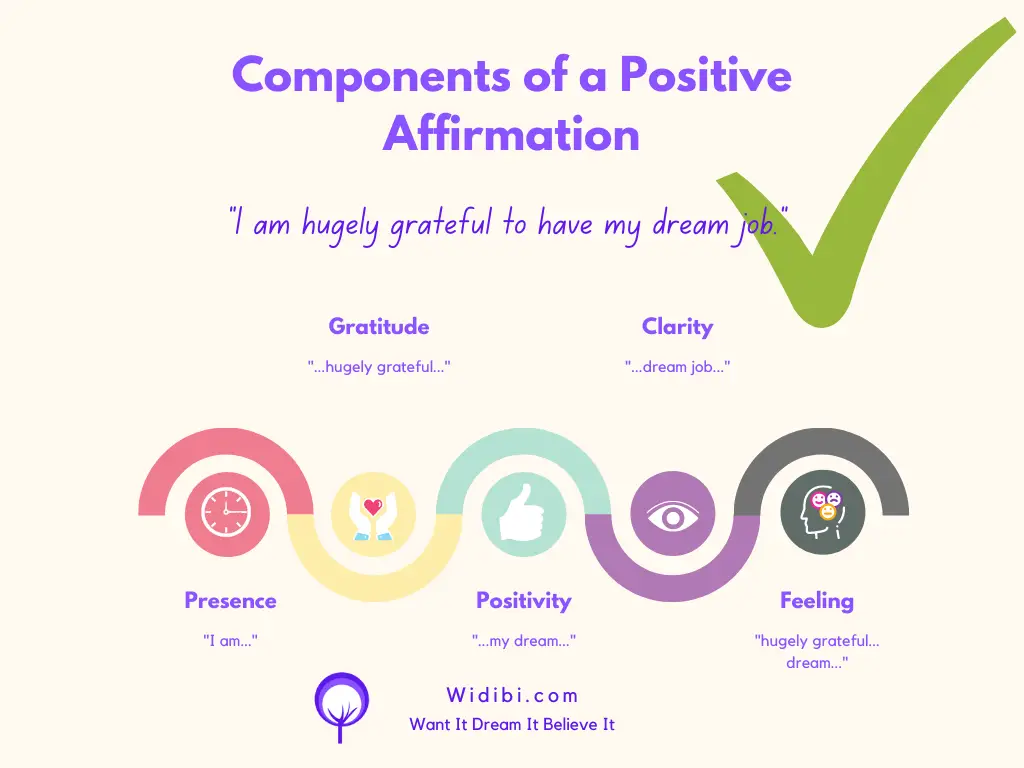The purpose of affirmations is to make a positive statement that, in turn, will have a positive impact on your life. While affirmations can be negative, that would require you to deliberately affirm something bad – which you probably don’t want to do!
Positive affirmations can:
- Serve as the building blocks for manifestation in the law of attraction
- Create positive habits for each day
- Provide reassurance that you really are as great as you want to be
- Dismiss negative thoughts, actively bringing you back around to being positive
By definition, an affirmation is a statement that something is true. If you affirm that the sky is blue, you won’t get many complaints from people. However, the real power and purpose of affirmations stem from the ability to make a statement and cause it to be true.
This works by building on the fact that you can change how you feel with affirmations.
If you’re feeling lazy one day but affirm, “I am motivated to get things done,” does that suddenly make it true? Perhaps surprisingly, it can.
In This Article
Affirmations for Manifestation
If you use the law of attraction and want to make things happen in your life, affirmations are a fantastic way of going about it.
Manifestation is a component of the law of attraction that sees your thoughts becoming reality. Now obviously, it’s not as simple as closing your eyes, affirming the new car in the driveway, opening your eyes, and it being there. Things take time, but if you practice the law of attraction, you come to learn that your thoughts and, more specifically, the energies you form can become a reality.
Affirmations are great for this because they’re inherently positive and usually include gratitude too. Take a look at this image, covering the building blocks of a successful affirmation for manifestation:

Based on this image, you’re in the moment, grateful, clear, and positive. They’re all positive energies, and good energy is far more potent than bad.
For me, affirmations are the building blocks of manifestation, and everything I and thousands of others want to manifest all starts with a simple affirmation.
Affirmations Don’t Need the Law of Attraction
Of course, you don’t need to have any interest in any of the universal laws to make use of affirmations.
While I associate the two, I can also observe that affirmations can be likened to giving yourself a compliment.
Earlier, I mentioned using affirmations to make you feel motivated when you’re otherwise being lazy. I stated it can work, and that’s because of the commitment you’re making to yourself.
When I was much younger, long before I knew anything about the law of attraction and prior to Affirmation by Savage Garden hitting the airwaves, I happened upon a technique.
When I needed to do something but didn’t want to, I’d count myself in.
I’d literally say out loud, “1… 2… 3…,” and then start doing it.
Why? Well, it was almost like a trigger. I have no idea when I did it first, but it always stayed with me that it worked. I’ve written extensively here at Widibi about how there’s nothing like first-hand proof to convince you that something works. Your first manifestation will give you the confidence to keep going, for example.
In my head, I’d found something that worked. If I was being lazy, procrastinating, or distracted, I’d count myself in.
It worked because I built a habit of sorts. While it’s not, by definition, an affirmation, I trusted myself. Most importantly, I valued my past and future selves.

I couldn’t let it not work because it’d be letting down my past selves that had used it with confidence. I had to make it work; otherwise, my future selves would be unable to take advantage of it.
Affirmations find a purpose in doing something similar. You don’t need the universe or the law of attraction for these techniques to work because you don’t want to let yourself down.
Affirmations for Consistency
Another purpose of affirmations is their inherent consistency. If you’ve never tried affirmations before, I can almost guarantee you’ll enjoy it.
Here’s how to write an affirmation if you’re brand new to the concept, and while it does focus on manifesting, the same principles apply (I even borrowed the first image in this article from that post).
Once you’ve written your affirmations down, perhaps on an affirmation list, you’ll find yourself drawn back to them. You’ll build a habit of saying, thinking, writing, or listening to them every day. That alone can see them serving their purpose.
There are so many examples out there of people being able to tell how a day is going to go based on the first few minutes.
Some make the bed to accomplish an early task, setting the tone for getting things done. Others might make a to-do list or a schedule each evening so they can get straight down to it in the morning while leaving themselves no time for procrastination.
Affirmations can become one of those daily habits or start a brand new one. You don’t need me to tell you how beneficial it can be to actively commit to being positive, grateful, and to have an open mind throughout the day ahead.
Even if the purpose of affirmations is merely to put you in the right frame of mind before facing the challenges of the day, if it works – and it will – then you’ve got a hefty return on the few minutes invested.
The Purpose of Affirmations – In Summary
The purpose of affirmations is to add positivity, gratitude, and confidence to your mindset. They’re vital parts of many universal laws, but they can work independently too, plus they’re entirely personal. They can serve as encouragement, get rid of negativity, provide structure, and so much more.
Indeed, for a few words in a single sentence, they’re pretty powerful!










